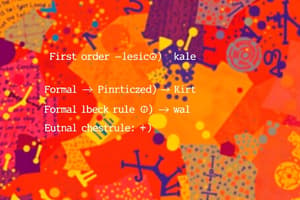Podcast
Questions and Answers
What defines a sound argument?
What defines a sound argument?
- It has at least one false premise.
- Its conclusion can be logically inferred from the premises.
- It only relies on informal logic.
- It is valid and all its premises are true. (correct)
Which type of logic primarily uses symbolic notation?
Which type of logic primarily uses symbolic notation?
- Formal Logic (correct)
- Empirical Logic
- Practical Logic
- Informal Logic
What does the conjunction logical connective represent?
What does the conjunction logical connective represent?
- True if at least one statement is true.
- True if both statements are true. (correct)
- False if both statements are false.
- True unless one statement is false.
Which fallacy involves misrepresenting an argument to refute it easily?
Which fallacy involves misrepresenting an argument to refute it easily?
In informal logic, what is primarily examined?
In informal logic, what is primarily examined?
Flashcards are hidden until you start studying
Study Notes
Definition of Logic
- Logic is the systematic study of valid reasoning.
- It involves the evaluation and structure of arguments.
Types of Logic
-
Formal Logic
- Focuses on the form of arguments.
- Uses symbolic notation to express logical forms.
- Includes propositional logic and predicate logic.
-
Informal Logic
- Examines natural language arguments.
- Focuses on the context and content of arguments.
- Addresses fallacies and reasoning patterns.
Key Concepts
- Argument: A set of statements where some statements (premises) support another statement (conclusion).
- Premise: A statement that provides evidence or support in an argument.
- Conclusion: The statement that is being supported or argued for.
- Validity: An argument is valid if the conclusion logically follows from the premises.
- Soundness: An argument is sound if it is valid and all its premises are true.
Logical Connectives
- Conjunction (AND): True if both statements are true.
- Disjunction (OR): True if at least one statement is true.
- Negation (NOT): Inverts the truth value of a statement.
- Implication (IF...THEN): True unless a true premise leads to a false conclusion.
- Biconditional (IF AND ONLY IF): True if both statements have the same truth value.
Common Fallacies
- Ad Hominem: Attacking the person instead of the argument.
- Straw Man: Misrepresenting an argument to make it easier to attack.
- Appeal to Authority: Assuming something is true because an authority says it is.
- False Dilemma: Presenting two options as the only possibilities.
Applications of Logic
- Used in mathematics, computer science, philosophy, and linguistics.
- Helps in developing clear and effective communication.
- Aids in problem-solving and critical thinking skills.
Definition of Logic
- Logic systematically studies valid reasoning and argument evaluation.
- It structures arguments to differentiate between sound reasoning and fallacies.
Types of Logic
-
Formal Logic:
- Emphasizes the structure of arguments using symbolic notation.
- Includes fields such as propositional and predicate logic.
-
Informal Logic:
- Analyzes arguments presented in natural language.
- Focuses on context and content, identifying fallacies and reasoning patterns.
Key Concepts
- Argument: Comprises a set of statements where premises support a conclusion.
- Premise: Provides the evidence or reasons supporting the argument.
- Conclusion: The statement being argued for, derived from the premises.
- Validity: Describes an argument where the conclusion logically follows from the premises.
- Soundness: An argument is sound if it is both valid and all premises are true.
Logical Connectives
- Conjunction (AND): True only when both statements hold true.
- Disjunction (OR): True if at least one of the statements is true.
- Negation (NOT): Reverses the truth value of a statement.
- Implication (IF...THEN): True unless a true premise leads to a false conclusion.
- Biconditional (IF AND ONLY IF): True when both statements share the same truth value.
Common Fallacies
- Ad Hominem: Attacks the person making an argument rather than the argument itself.
- Straw Man: Distorts an argument to make it easier to refute.
- Appeal to Authority: Assumes truth based solely on an authority figure’s claim.
- False Dilemma: Presents limited options as the only possible choices.
Applications of Logic
- Integral to fields like mathematics, computer science, philosophy, and linguistics.
- Enhances clear communication and effective argumentation.
- Supports problem-solving abilities and nurtures critical thinking skills.
Studying That Suits You
Use AI to generate personalized quizzes and flashcards to suit your learning preferences.




